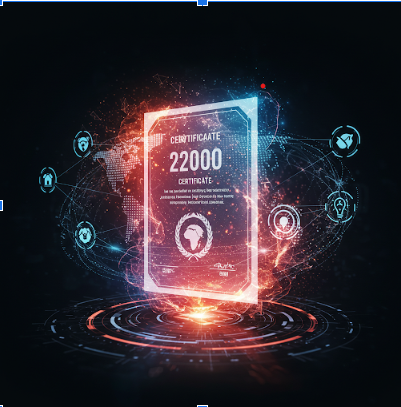In a world where consumers are increasingly mindful of what they eat, food safety has evolved from a mere compliance requirement into a cornerstone of trust and market success. Whether you’re a small food processor, a global exporter, or part of a complex supply chain, ISO 22000 certification offers far more than a certificate to hang on the wall—it’s a key that opens doors to markets, partnerships, and enduring credibility. But here’s the thing: achieving ISO 22000 certification isn’t just about meeting international standards. It’s about proving that your organization takes food safety seriously—every single day, across every process.
So, let’s talk about how ISO 22000 doesn’t just keep your products safe—it makes your business stronger, more competitive, and far more appealing to global buyers.
What Exactly Is ISO 22000 Certification?
To put it simply, ISO 22000 is the international standard for Food Safety Management Systems (FSMS). Developed by the International Organization for Standardization (ISO), it provides a structured framework that enables food-related businesses—whether producers, manufacturers, distributors, or retailers—to identify, control, and continually improve food safety risks.
Unlike local food safety laws that might focus on specific stages of production, ISO 22000 covers the entire food chain. That means everything—from raw material sourcing to processing, packaging, transportation, and even storage—comes under a single, harmonized system.
And this is where it stands out: ISO 22000 integrates principles of the Hazard Analysis and Critical Control Point (HACCP) system, but it takes it a step further. It combines HACCP’s scientific approach with ISO’s systematic management structure—bringing consistency, accountability, and continual improvement into every corner of your operations.
Why ISO 22000 Matters for Market Access
Now, here’s the reality: the food industry is one of the most regulated sectors globally. Each country has its own rules, certifications, and quality standards. For businesses trying to export, this patchwork of regulations can become a logistical nightmare.
That’s where ISO 22000 steps in as a global passport. Because it’s recognized and respected worldwide, it smooths your entry into foreign markets. Many importers, retailers, and distributors across Europe, the Middle East, and Asia now require ISO 22000 certification from their suppliers before even considering a contract.
Building Competitiveness Through Trust
Food safety isn’t just a technical requirement—it’s an emotional promise. Consumers today want assurance that what they eat is safe, hygienic, and produced responsibly. And when they see that your company holds ISO 22000 certification, it builds instant trust.
That trust translates directly into competitiveness. When customers have to choose between two suppliers—one certified, one not—guess who gets the call? Certification demonstrates transparency and reliability, qualities that global buyers, restaurant chains, and retailers value deeply.
Legal and Regulatory Confidence
Food safety regulations vary from country to country, but they share one thing in common: zero tolerance for non-compliance. Whether it’s the EU Food Safety Regulation, the U.S. FDA’s FSMA, or the FSSAI rules in India—businesses must demonstrate due diligence in preventing contamination and ensuring safety.
ISO 22000 bridges the gap between global laws and local requirements. Its structure aligns neatly with international regulations, giving you confidence that your system is compliant wherever you operate. That means fewer worries about inspection penalties, recalls, or shipment rejections.
ISO 22000 and Brand Reputation
Here’s something worth remembering: a single food safety incident can destroy years of hard-earned reputation. News travels fast—especially bad news. Consumers don’t just stop buying from you; they stop trusting you.
ISO 22000 certification acts as a safety net against that risk. By enforcing preventive controls and traceability systems, it helps detect issues early—long before they escalate into crises.
Moreover, certification communicates a sense of responsibility. It shows your stakeholders that you’re not just reacting to regulations but actively working to protect their health. That’s a powerful message in a time when corporate responsibility shapes brand identity as much as marketing does.
Integrating ISO 22000 with Other Standards
If your organization already follows ISO 9001 (Quality Management) or ISO 14001 (Environmental Management), you’ll find that ISO 22000 integrates seamlessly with them. The structure—known as the High-Level Structure (HLS)—makes it easy to combine multiple standards under one management system.
This not only reduces administrative burden but also creates a unified approach to quality, safety, and environmental performance. Imagine managing all your compliance needs through one coherent system—it saves time, reduces errors, and keeps everyone on the same page.
The Human Side of Food Safety
At its core, ISO 22000 is about people. It’s about workers who handle ingredients daily, managers who design processes, and customers who trust your products. The certification encourages a culture where everyone—from line staff to executives—understands their role in maintaining food safety.
That shared sense of responsibility creates unity and pride. Employees become more engaged because they see the bigger picture—their work isn’t just about meeting quotas; it’s about protecting lives. And that’s something worth believing in.
Final Thoughts: Certification as a Strategic Investment
So, is ISO 22000 certification worth the effort? Absolutely. It’s not merely a compliance checkbox—it’s a competitive strategy. It opens global doors, earns consumer trust, builds resilience, and aligns your organization with the highest standards of food safety.
As global trade continues to grow and consumers demand transparency, ISO 22000 remains one of the most effective ways to stand out in a crowded market.
Food safety isn’t just about avoiding risks—it’s about seizing opportunities. ISO 22000 certification gives you the credibility, confidence, and clarity to do just that.
